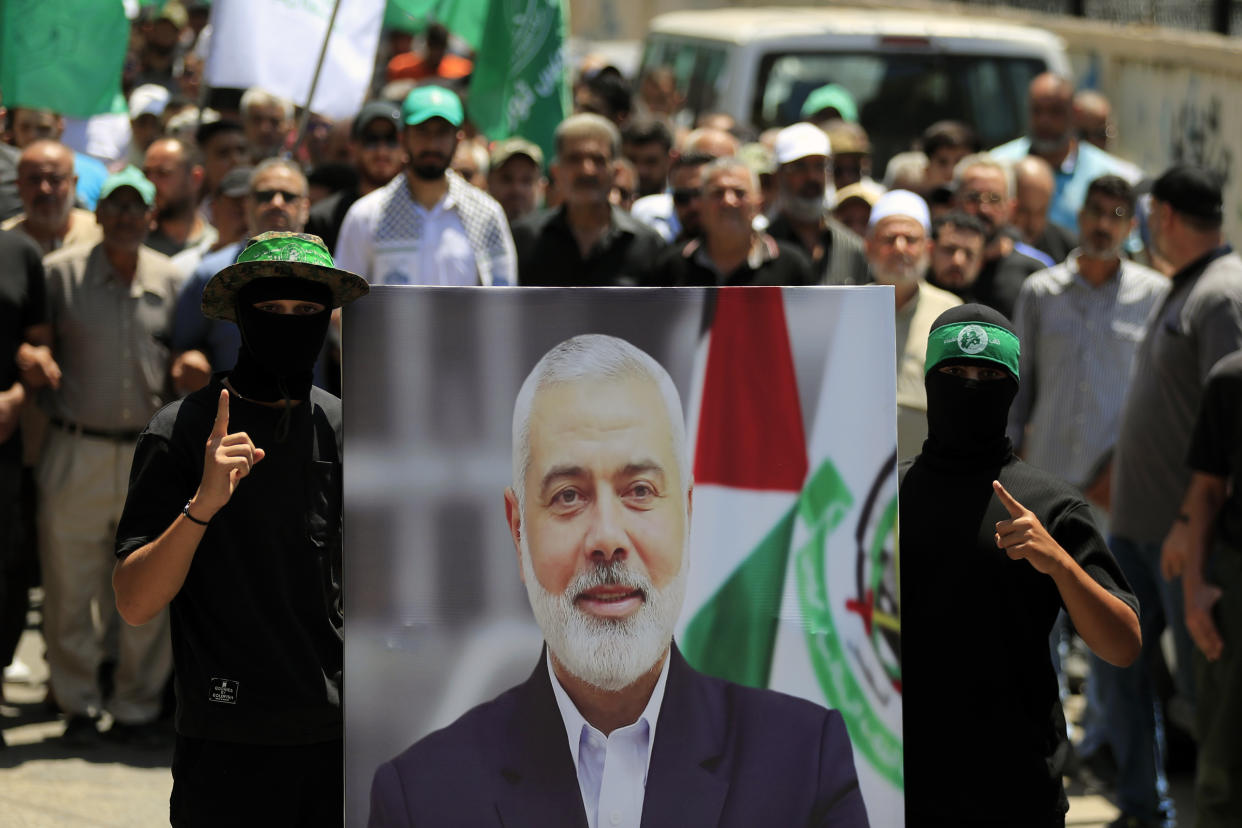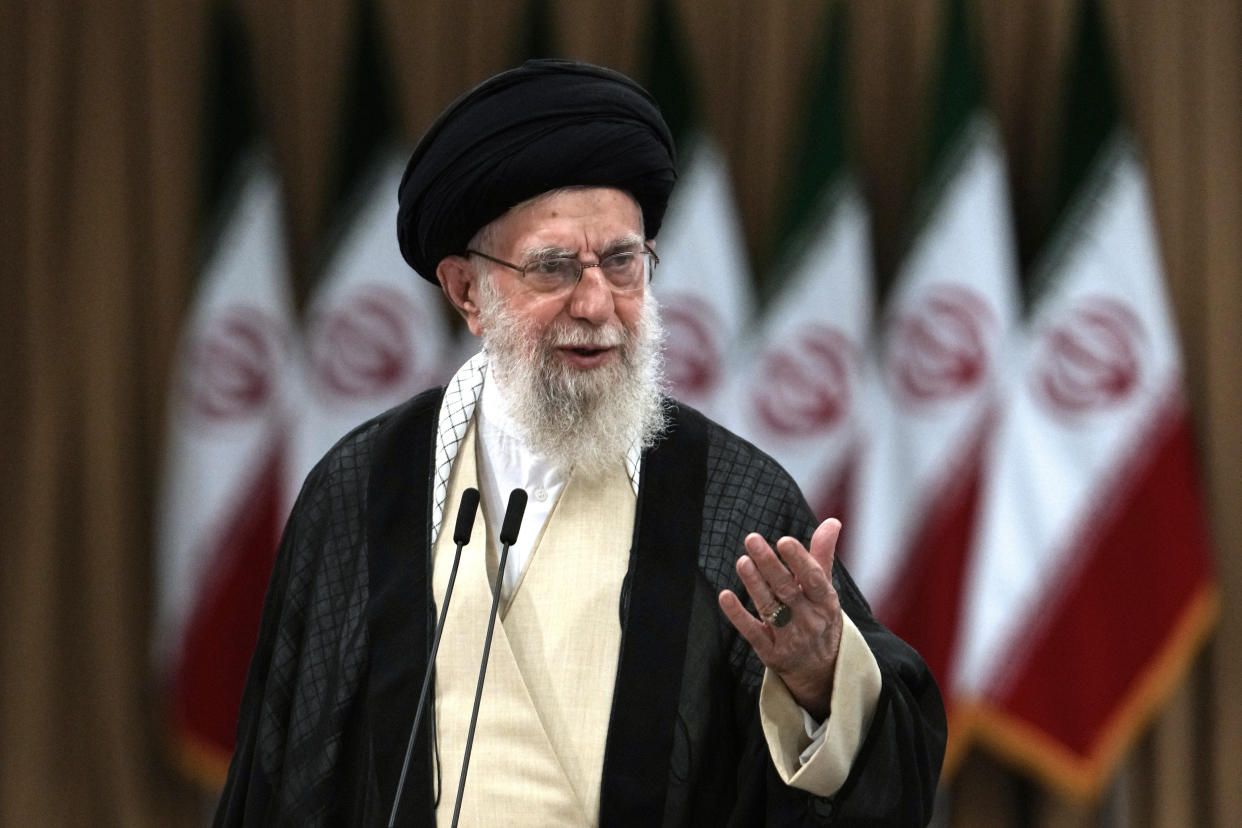Assassination of top Hamas commander 'could disrupt UK supply chains' in Red Sea

The assassination of top Hamas commander Ismail Haniyeh could see Houthi rebels escalate their maritime attacks in the Red Sea disrupting the UK's supply chain, Middle East experts have warned.
Burcu Ozcelik, senior research fellow, Middle East security, at the Royal United Services Institute, told Yahoo News the UK also faces potentially strained relations amid discussions on arms exports amid Israel's war with Gaza.
Haniyeh was assassinated in the Iranian capital of Tehran early on Wednesday morning, less than 24 hours after Israel claimed to have killed Hezbollah's most senior military commander in Lebanon in retaliation for a deadly rocket strike in the Israeli-occupied Golan Heights.
"The night of double assassinations will put pressure on the UK government at a time when diplomatic relations with Israel are at risk of being strained over recent steps, such as reports that the UK’s arms exports may be limited pending legal review due to allegations of war crimes being conducted in Gaza," Ozcelik said.
"The UK will need to walk a fine line between continuing to defend Israel’s legitimate right to self-defence and security, while also defending the sanctity of international humanitarian law and the need for a permanent ceasefire in Gaza.
"There is currently also the risk that the Yemen-based Houthi militant group will escalate its attacks on maritime trade in the Red Sea following the Haniyeh assassination, with implications for supply chain security that impacts the UK."
Israeli Prime Minister Benjamin Netanyahu's government has made no claim of responsibility over Haniyeh's death.
After Iran's supreme leader Ayatollah Ali Khamenei said Israel had “prepared a harsh punishment for itself” and Hamas vowed Haniyeh's replacement would “follow the same vision” regarding Gaza, experts agreed that the assassination would also lead to a "major delay" in ceasefire talks.

"The killing of Ismail Haniyeh ends the ceasefire deal that was being negotiated by the US, Qatar, and Egypt," Chatham House associate fellow Lina Khatib told Yahoo News. "Israel has forced a reset in negotiations so that any eventual deal to end the Gaza conflict will be more in Israel’s favour."
RUSI research analyst Urban Coningham said: "In the short term, we should expect to see a major delay in any talks of a ceasefire agreement between Israel and Hamas. It is almost impossible to negotiate successfully as one side assassinates senior leaders of the other side.
"In terms of the current conflict in Gaza, the assassination of Haniyeh gives Netenyahu critical space for manoeuvre domestically. The articulated goal of the war on Gaza from the start of Israel’s military operation following October 7th has been destroying Hamas – even though it is clear that it is impossible to accomplish the complete destruction of an ideology and a resilient terrorist group. Therefore the only way for Netenyahu to justify a victory to the Israeli population is through the killing of senior Hamas leaders."
Click the headlines below to read more from our news partners about this story
> Israel 'not seeking war escalation'
> Israel’s shadowy history of suspected assassinations inside Iran
> Hamas leader killed in Iran, pushing Middle East closer to the brink
> Israelis fear for hostages after Hamas chief's killing
Israel not seeking war escalation, defence minister says
Israel is not seeking to escalate war, but is preparing to handle all scenarios, Defence Minister Yoav Gallant said on Wednesday while praising forces who carried out an attack on a Hezbollah commander in Beirut overnight.
During his visit, Gallant spoke with air defence officers regarding Israel's killing of the top commander in Iran-backed Hezbollah, who Israel says was responsible for a rocket attack on Saturday that killed 12 children and teenagers in the Israeli-occupied Golan Heights.
"We don't want war, but we are preparing for all possibilities, and that means you must be prepared as needed, and we will do our job at all the levels above you," he said.
Read the full story from Reuters.
Israel’s shadowy history of suspected assassinations inside Iran
Israel has remained silent in response to accusations it was behind the assassination of Ismail Haniyeh, Hamas’s political chief, in Tehran, but it has long been suspected of orchestrating targeted killings, drone strikes and cyber attacks within Iran.
A major focus for Israeli intelligence in recent years has been Iran’s nuclear programme and fears Tehran is building a clandestine nuclear bomb that could be used with devastating effect against Israel.
Iran denies ever having a nuclear weapons programme or wanting one, but it has expanded and accelerated its civil nuclear energy facilities, which reduce the time it would need to build a nuclear bomb if it chose to.
Read the full story from The Telegraph.
Hamas leader killed, pushing Middle East closer to the brink
The US and other powers have long feared a direct confrontation between Iran and Israel, which have for decades fought a shadow war of espionage and assassination.
An exchange of attacks in April, on an Iranian embassy in Syria and then a return attack on Israeli soil, marked an earlier escalation which stopped short of further conflict.
Iran has long funded, armed, and trained Israel's enemies, including Hamas in Gaza and the armed group Hezbollah in Lebanon.
The killing of Haniyeh came only hours after Israel targeted a Hezbollah commander in Beirut.
Read the full story from Business Insider.
Israelis fear for hostages after Hamas chief's killing
Concerns grew among Israelis on Wednesday over the fate of dozens of hostages still held captive in Gaza following the killing of Hamas chief Ismail Haniyeh in Tehran.
Haniyeh's killing "was a mistake as it threatens the possibility of having a hostage deal," said Anat Noy, a resident of the coastal city of Haifa, in his 50s.
"We woke up today with a sense of fear in our hearts that this can escalate even more. There is no calm... we are afraid."
On Wednesday, Hamas and the Iranian Revolutionary Guards announced that Haniyeh, 61, had been killed in Tehran in an Israeli air strike.
He was in the Iranian capital to attend the swearing-in on Tuesday of President Masoud Pezeshkian.
Read the full story from AFP.


